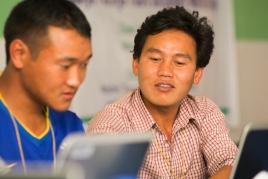What is Rapid Word Collection?
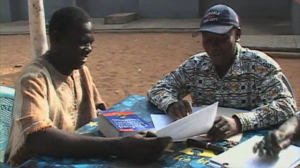 The Rapid Word Collection (RWC) method revolutionizes the task of collecting words by using a systematic method to capture words in a workshop organized in the language community. Rather than the language worker collecting words over a period of many years and then publishing a work containing 5,000 words or so, RWC workshops can achieve a total of 10,000 or more entries during a brief two-week period. The only other method that comes close to the effectiveness of Rapid Word Collection is the text corpus method--the highly technical process of gleaning words from thousands of vernacular texts, which are in short supply for most languages which have only begun to be expressed in written form.
The Rapid Word Collection (RWC) method revolutionizes the task of collecting words by using a systematic method to capture words in a workshop organized in the language community. Rather than the language worker collecting words over a period of many years and then publishing a work containing 5,000 words or so, RWC workshops can achieve a total of 10,000 or more entries during a brief two-week period. The only other method that comes close to the effectiveness of Rapid Word Collection is the text corpus method--the highly technical process of gleaning words from thousands of vernacular texts, which are in short supply for most languages which have only begun to be expressed in written form.
Why collect words?
 Words are the building blocks of communication. They contain information not only about language, but also about culture. Many of the smaller language communities around the world are hampered by the fact that no dictionary exists in their language. Assisting a language community to capture the words and meanings of their language can have a number of positive benefits:
Words are the building blocks of communication. They contain information not only about language, but also about culture. Many of the smaller language communities around the world are hampered by the fact that no dictionary exists in their language. Assisting a language community to capture the words and meanings of their language can have a number of positive benefits:
- Fosters communication between the language community and speakers of the national language.
- Serves as a repository of information about the language and culture.
- Raises the status and value of the language.
- Provides the community with a needed tool for language development.
How does it work?
Rapid Word Collection is a carefully structured process developed by a team of SIL linguists and researchers for the purpose of speeding up dictionary development. During each workshop, participants (mother tongue speakers of the language) are assigned specific roles: coordinator, logistics manager, team leaders, typists, glossers and spelling experts. RWC consultants are on hand to provide support as needed. Consultants-in-training also participate and gain experience for a future leadership role. For data collection, participants use FLEx, an SIL software package which guides users through the process of data entry and formatting the completed dictionary for online publication on Webonary.org.
participants (mother tongue speakers of the language) are assigned specific roles: coordinator, logistics manager, team leaders, typists, glossers and spelling experts. RWC consultants are on hand to provide support as needed. Consultants-in-training also participate and gain experience for a future leadership role. For data collection, participants use FLEx, an SIL software package which guides users through the process of data entry and formatting the completed dictionary for online publication on Webonary.org.
Central to the RWC process is the concept of semantic domains: words related to a certain aspect of life or experience, such as Person or Social Behavior. In order to gather words for their dictionary, RWC workshop participants proceed through a series of questions designed to bring to mind vocabulary on that theme.
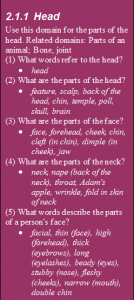 Given the uniqueness of each culture, it is largely held that the domains of a language are unique and a unique set of domains must be discovered for each language—a task so daunting that few have undertaken it. While it is true that each language has some unique domains, humans from different cultures are more alike than different and there is a large degree of universality in the semantic domains used. The same universality and variation exists in the phonological and grammatical systems of a language. These semantic domains and elicitation questions do not purport to be universal. But they have proven to work in a wide variety of languages to stimulate the neural networks and trigger the release of all kinds of related words.
Given the uniqueness of each culture, it is largely held that the domains of a language are unique and a unique set of domains must be discovered for each language—a task so daunting that few have undertaken it. While it is true that each language has some unique domains, humans from different cultures are more alike than different and there is a large degree of universality in the semantic domains used. The same universality and variation exists in the phonological and grammatical systems of a language. These semantic domains and elicitation questions do not purport to be universal. But they have proven to work in a wide variety of languages to stimulate the neural networks and trigger the release of all kinds of related words.
The human brain has the ability to rapidly recall the words that belong to a semantic domain, jumping from word to word along the pathways of lexical relations. So when someone is asked to list the words that are related to the word "sun", they can quickly come up with a number of words such as "moon, light, sunbeam, shine, sunrise, noon, sunset, sunstroke." When words are gathered for each of the nearly 1800 semantic domains, the lexical database containing the building blocks of a language grows very quickly.
*****************
You can't preserve the culture without knowing about the language. —Abdul Razak Sulemana, Master of Philosophy-Linguistics, University of Ghana-Legon
One of the important things is the dictionary. So if the dictionary is able to come into existence, Wow! So with a dictionary, it will give easy access for us to actually teach our children in our own language. —Peter Adaawen, Project Coordinator, Buli Literacy Project
To be able to do this in ten days is revolutionary and I will urge languages that would like to make dictionaries to adopt this methodology. —Dr. George Akanlig-Pare, Professor of Linguistics, University of Ghana-Legon

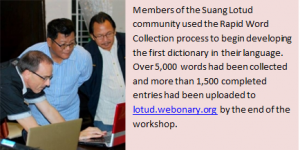
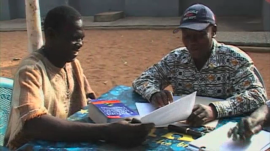 Webonary gives language groups the ability to publish bilingual or multilingual dictionaries on the web with a minimum of technical help.
Webonary gives language groups the ability to publish bilingual or multilingual dictionaries on the web with a minimum of technical help.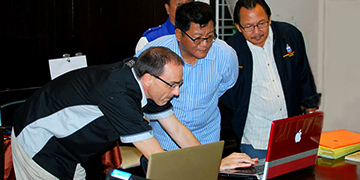 With lexical data in FLEx, the process is simple: 1.
With lexical data in FLEx, the process is simple: 1. 